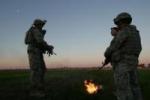People and ideas influence events, but geography largely determines them, now more than ever. To understand the coming struggles, it’s time to dust off the Victorian thinkers who knew the physical world best. A journalist who has covered the ends of the Earth offers a guide to the relief map—and a primer on the next phase of conflict.
When rapturous Germans tore down the Berlin Wall 20 years ago it symbolized far more than the overcoming of an arbitrary boundary. It began an intellectual cycle that saw all divisions, geographic and otherwise, as surmountable; that referred to “realism” and “pragmatism” only as pejoratives; and that invoked the humanism of Isaiah Berlin or the appeasement of Hitler at Munich to launch one international intervention after the next. In this way, the armed liberalism and the democracy-promoting neoconservatism of the 1990s shared the same universalist aspirations. But alas, when a fear of Munich leads to overreach the result is Vietnam—or in the current case, Iraq.
And thus began the rehabilitation of realism, and with it another intellectual cycle. “Realist” is now a mark of respect, “neocon” a term of derision. The Vietnam analogy has vanquished that of Munich. Thomas Hobbes, who extolled the moral benefits of fear and saw anarchy as the chief threat to society, has elbowed out Isaiah Berlin as the philosopher of the present cycle. The focus now is less on universal ideals than particular distinctions, from ethnicity to culture to religion. Those who pointed this out a decade ago were sneered at for being “fatalists” or “determinists.” Now they are applauded as “pragmatists.” And this is the key insight of the past two decades—that there are worse things in the world than extreme tyranny, and in Iraq we brought them about ourselves. I say this having supported the war.
So now, chastened, we have all become realists. Or so we believe. But realism is about more than merely opposing a war in Iraq that we know from hindsight turned out badly. Realism means recognizing that international relations are ruled by a sadder, more limited reality than the one governing domestic affairs. It means valuing order above freedom, for the latter becomes important only after the former has been established. It means focusing on what divides humanity rather than on what unites it, as the high priests of globalization would have it. In short, realism is about recognizing and embracing those forces beyond our control that constrain human action—culture, tradition, history, the bleaker tides of passion that lie just beneath the veneer of civilization. This poses what, for realists, is the central question in foreign affairs: Who can do what to whom? And of all the unsavory truths in which realism is rooted, the bluntest, most uncomfortable, and most deterministic of all is geography.







Bookmarks